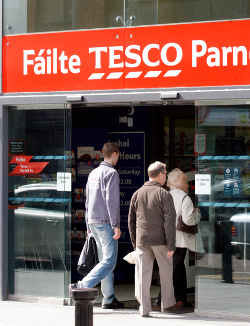Waging a war

Now that the economy is showing slight signs of improvement, it has brought up the thorny issue of wages. While the larger multiples might be in a position to grant a long awaited pay rise, the smaller retailer who is still struggling with costs, certainly is not. Will this create issues for small business as pay scales differ between the multiple and convenience sectors, asks Fionnuala Carolan
21 May 2014

The Irish grocery market is returning to growth for the first time in six months, according to share figures from Kantar Worldpanel in Ireland. The latest figures show consumers making slightly fewer shopping trips but buying more groceries each visit.
On top of this, the unemployment rate in this country has fallen from a high of 15.1% in 2012 to 11.7% in April 2014, according to CSO figures. Many companies implemented a 10% decrease in wages across the board in 2008/2009 when the economy was in dire straits, and most implemented pay freezes that are still standing. So with the recent figures suggesting that that economy is showing some signs of improvement, it was never going to be long before workers started demanding higher wages. The unions and their members want a little payback for the hard slog they have endured over the past five years.
Trade union Mandate has already secured more than €20 million in pay increases over the past 24 months, according to the union’s general secretary John Douglas. While this is good news for the workers in these companies, it has an unfortunate effect on those retailers who are still struggling to pay current wage rates. It creates a two-tier system where wages in the multiples will be on a different scale to those in smaller and independent stores which could make it more difficult to attract staff in the years ahead, creating yet another impetus for small business failure.
A number of retailers that ShelfLife spoke with said they were worried about the recent pay rises in the multiples and would not be able to offer similar pay rises to their staff this year. Joe Sweeney, last year’s president of the NFRN and the owner of a Centra store in South Dublin said that very few retailers he knew could contemplate giving staff pay rises at present. "Independent retailers can’t afford to increase costs of running their business," he said. "Whatever uplift in the economy has definitely not come through to this end of retail. We have seen no increase in spend or margins. It is simply not affordable to increase wages. Over the past five years there has been a continual tightening up of costs. Wages is one cost where a retailer can make savings as opposed to fixed costs like rents and rates."
Sweeney said that although he has decreased staff over the past five years, he is not yet in a position to increase his staff numbers.
"I had 18 on the payroll at one stage but I only have 10 now. Since 2008 I have never replaced staff that left. I have just redistributed the workload. My family help out in the business now and that is the same for many other small businesses."
Another retailer, who didn’t wish to be named said that there was "no way" she could afford to give pay rises at the moment because "things are still extremely tight".

In 2012 unemployment hit its highest point at 15.1%
Pay rise for Tesco workers
Making plenty of headlines last month was the news that trade union Mandate had secured a 2% increase in wages for Tesco workers. The pay increase, which will affect more than 14,000 workers in 147 stores across the country, will include a 1% payment backdated to 1 March this year with a further 1% due on 7 September.
Gerry Light, Mandate assistant general secretary said that this pay deal is in recognition of the hard work his members do in Tesco and the valuable contribution they make to the ongoing success of the company.
"This is a very significant agreement coming from the biggest retail employer in the country and we very much see it as a benchmark for other retail employers in Ireland," said Light.
"Recognising the fact that Tesco are facing many challenges in the marketplace, Tesco still see the value in giving their workers a pay increase and this is something other employers should take note of."
It is estimated the pay increase will equate to between €400 and €700 for Tesco staff members. While it may not be life changing, it has set a precedent for other retailers and is a sign that the largest retailer in the country must be performing well enough in order to afford this, despite Tesco’s share figure performance remaining behind the market. According to Kantar Worldpanel Ireland there are signs that this is beginning to stabilise with a 4.2% decline in sales – the lowest fall since July 2013.
Others following suit
In the wake of the Tesco wage increase Mandate is set to lodge a claim for a pay rise for 4,000 Penneys workers too. An existing agreement at the clothes retailer is set to expire in June, prompting talks on a new deal.
Meanwhile Marks & Spencer’s workers are beginning to make their voices heard in relation to pay and conditions. The British retailer employs approximately 2,300 workers in 17 stores across Ireland.
Mandate and SIPTU members in Marks & Spencer voted to reject a Labour Court Recommendation by a margin of 84% to 16% on 25 April. The recommendation from the Labour Court largely backed plans by Marks & Spencer management for cost cutting measures at the company.
Mandate Trade Union assistant general secretary, Gerry Light said: "This overwhelming rejection of the Labour Court Recommendation shows that workers in Marks & Spencer are united and prepared to fight to safeguard their conditions of employment.
"Our members don’t believe the proposed cuts are reasonable having regard to all of the circumstances. As far as they are concerned, the company has failed to provide sufficient evidence to justify them and this is why our members have made such a strong statement to the company and the Labour Court today."
Light explained that under the company’s plans, some workers would be expected to take a cut of more than 20% in their terms and conditions of employment.
Last year Marks & Spencer management closed the workers’ defined benefit pension scheme without agreement – informing the workers that their retirement fund is a ‘discretionary benefit’. Unlike many other defined benefit schemes, the Marks & Spencer scheme was a performing scheme and was in surplus to the tune of approximately €17m.
However Marks & Spencer said it "fully accepted" the Labour Court’s findings and is subsequently "considering [its] options". A spokesperson told ShelfLife: "We are very disappointed with how this is progressing and with the outcome of the ballot. We entered into the Labour Court process agreeing to accept the Labour Court’s independent recommendations and while the recommendations did not deliver all of the savings we required, we fully accepted their findings. We are now considering our options going forward."
Standards at Dunnes Stores
While the Marks and Spencer debacle rolls on, Mandate has since announced that it aims to tackle what it describes as "the ongoing deterioration of employment standards for Dunnes workers nationally".
On Sunday, 27 April Mandate launched the Decency for Dunnes Workers Campaign at the union’s Biennial Delegate Conference in Killarney, Co. Kerry.
Dunnes Stores employs 14,000 workers in the Republic of Ireland. The union said that it wants to bring employment conditions in line with the company’s major competitors in the retail sector. There are four key demands which include decent hours and earnings; job security; fair pay; and the right to trade union representation.
Light said: "There has been a dramatic increase in precarious work across the Irish retail sector and we have serious concerns based on feedback from our members that the employment standards in Dunnes Stores have deteriorated in recent years.
"Our members are demanding that the company address their key issues of concern. In this context, the union will be lodging a substantial claim with the company in the immediate future addressing all of the pertinent issues including a claim for a pay increase.
"There are now 147,000 people in the Irish economy classified as ‘underemployed’, meaning they cannot get enough hours of work. Many employers, particularly retail employers, are using the allocation of hours as a method of control and discipline over their workers and they do this by issuing low and zero hour contracts."
"Workers in Dunnes Stores are seeking the right to ‘banded hour contracts’ similar to their counterparts in Tesco, Supervalu and Penneys. This would give Dunnes workers a level of security over their hours and earnings."
The union also argues that despite a National Agreement being in place since 1996, Dunnes management has refused to implement the terms of the agreement meaning workers have been denied their right to representation, both individually and collectively.
Many retailers just surviving
While all this action is taking place across the multiple sector, Retail Excellence Ireland has said it wanted to refute union claims that pay increases were now acceptable in the retail industry.
Commenting on the matter David Fitzsimons, chief executive, Retail Excellence Ireland said: "Most retail companies are working hard to maintain wage levels and are struggling to keep their doors open. We are dealing will closures every day of the week and for pay increase demands to be made at such a fragile time in our domestic economy is highly irresponsible. Whilst the majority of retailers plan to work hard to maintain staff entitlements in 2014, of those planning any pay moderation, most are seeking pay reductions. Our members greatly value the important role their employees play in such a customer facing industry, however, for retail companies to continue to trade in what is an exceptionally challenging environment, a continued period of pay moderation is required."
Retail Ireland also warned against any increase in business costs saying that many retailers were only just surviving. Recent retail sales figures have shown that while the volume of sales (excluding cars and bars) has increased by 2.2% in the past year, the values of sales has stayed the same. This clearly indicates that shops are aggressively discounting in an effort to attract customers. It called on government to cut income tax to boost spending and stimulate activity in the domestic economy.
Retail Ireland director Stephen Lynam said: "Retail has been through the horrors, but the outlook is starting to look up. With good news on the jobs front and consumer confidence improving, we predict that consumer spending will increase by 1.9% this year. We can add 40,000 new jobs by 2020 to the existing total of 270,000 if we can get growth going in the economy and restore consumer spending to more normal levels. At the height of the boom many costs, including wages, spiralled out of control, we cannot allow this to happen again."
JLC
Representatives of small retailers such as the Convenience Stores and Newsagents Association (CSNA) are even concerned with the reintroduction of the Joint Labour Committee (JLC) pay structures which would set minimum wage rates higher for some sectors that others. They believe that this is putting small business owners at risk and will prevent them from hiring new staff. If small businesses are worried about the return of the JLCs, they are definitely not in a position to increase wages.
However, it is difficult not to feel for the staff of these businesses that can’t see any hope of a pay rise in the near future but must watch their counterparts in the multiples receiving more pay. It can only be a waiting game until these staff start to look for better paid positions in the multiples, and small retailers could be faced with losing quality personnel and having to hire those with less qualifications and experience. That old phrase about peanuts and monkeys springs to mind. It’s difficult to attract hard-working, long-term staff if you can’t pay them what they consider is a decent wage, and with the recent pay rises across the sector, the wages bar has now been raised.



 Print
Print






Fans 0
Followers